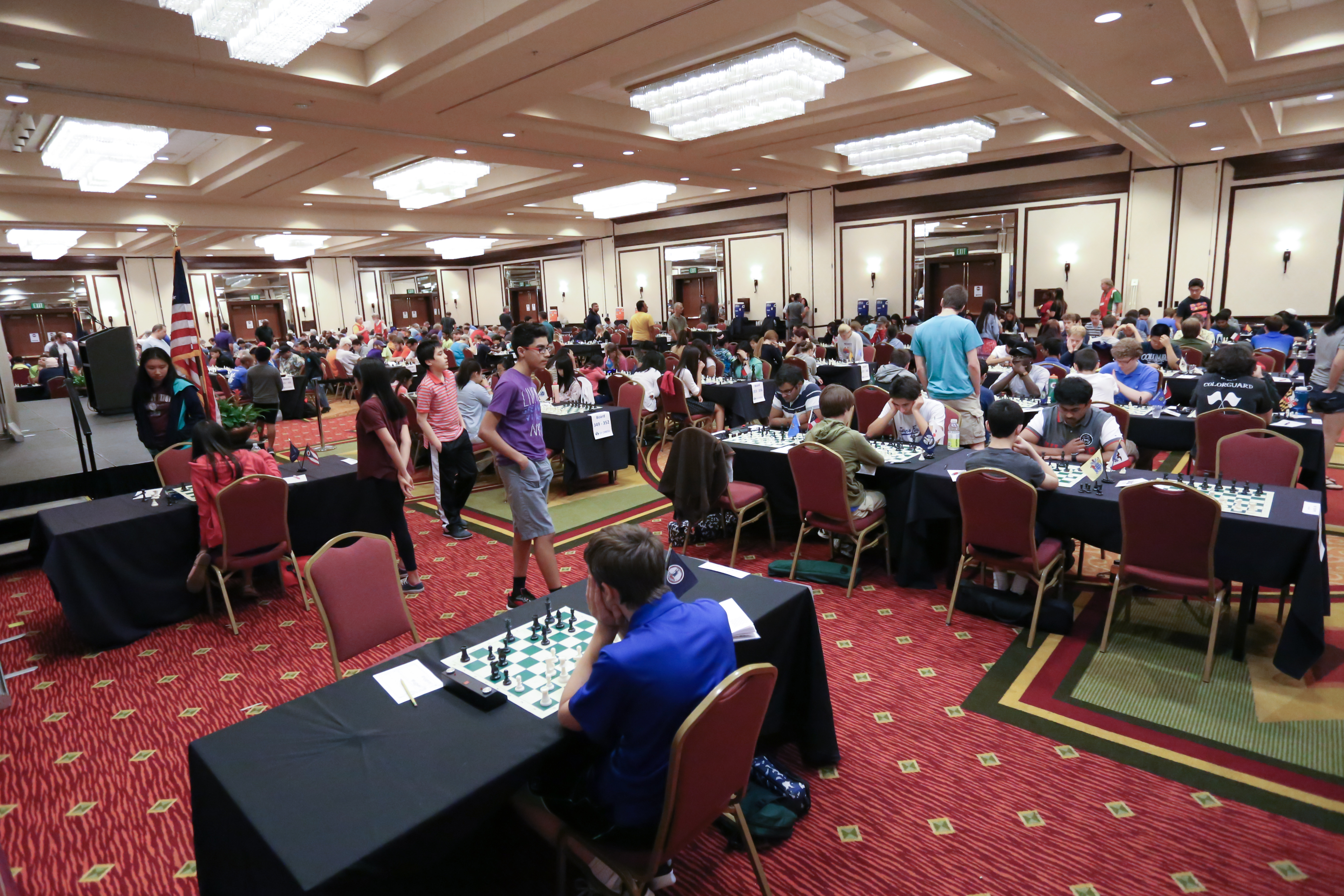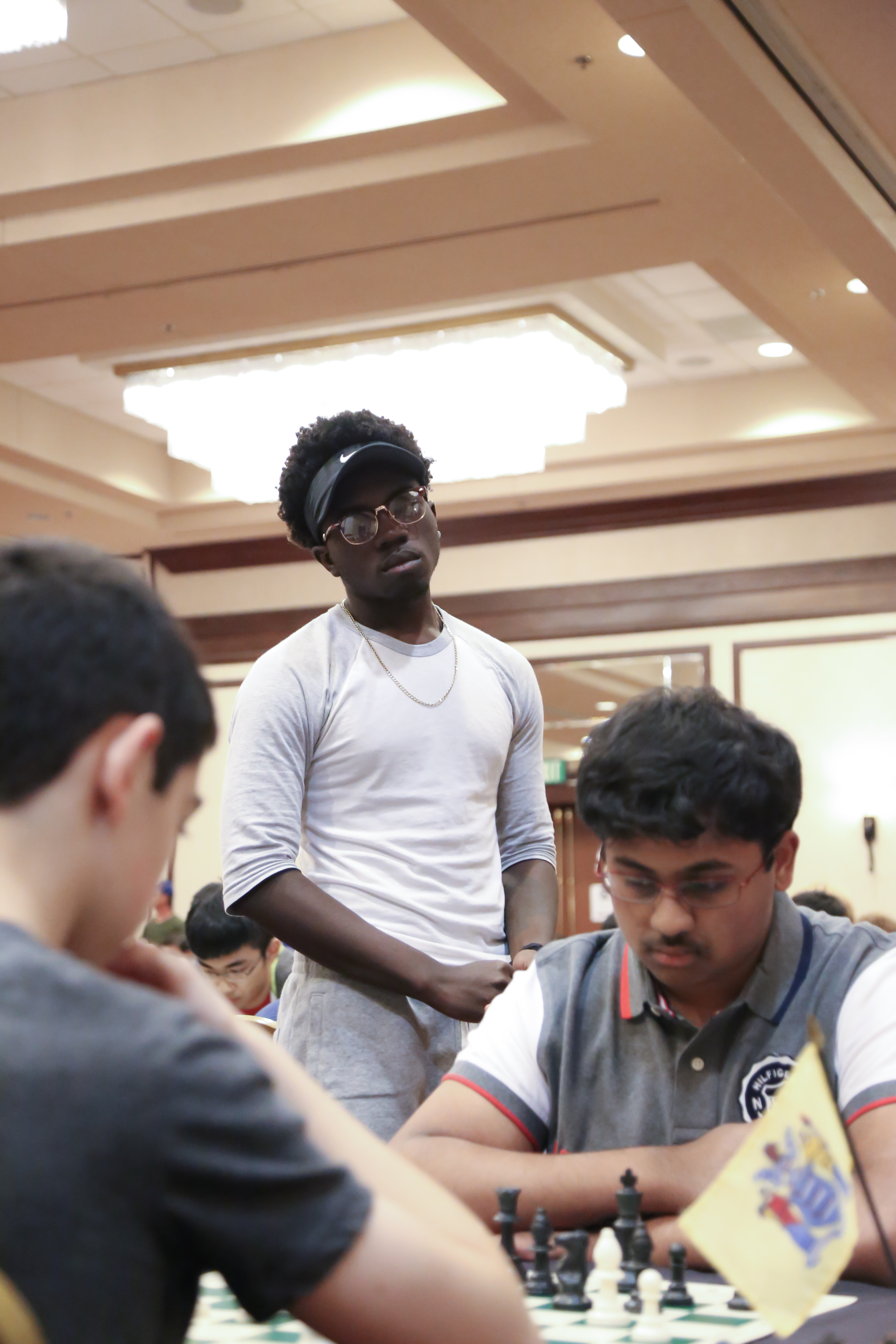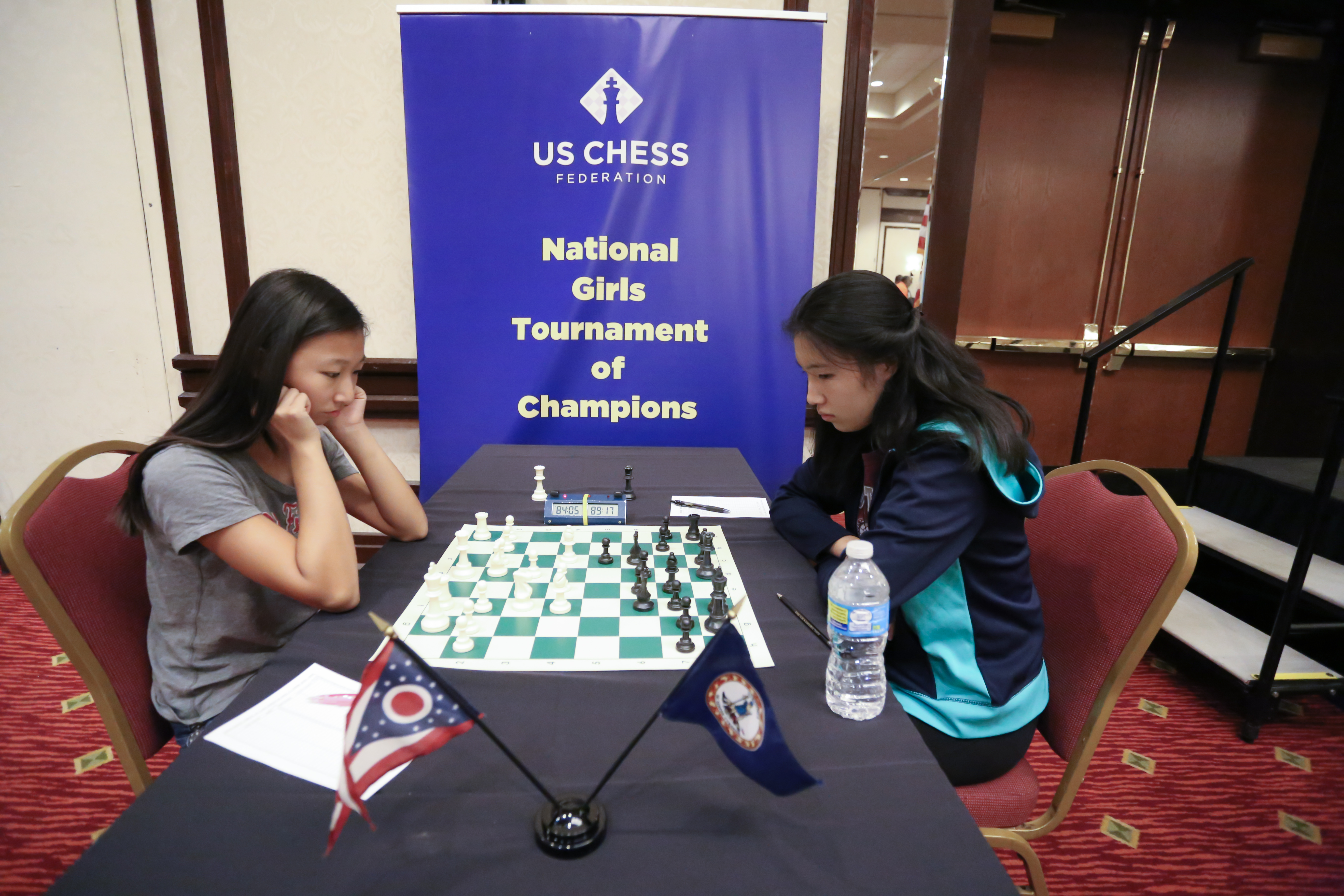 Tournament Hall, Photo Anne Buskirk
Tournament Hall, Photo Anne Buskirk Through two days, three 2400-rated high-schoolers: FM Justus Williams, NM Advait Patel, and IM Alexander Velikanov sit atop the Denker Tournament of High School Champions leaderboard with 3.0/3.
 Justus Williams looking at the game of Arshaq Saleem Photo Anne Buskirk
Justus Williams looking at the game of Arshaq Saleem Photo Anne Buskirk Both the Barber championship and the National Girls’ Tournament of Champions are also led by a three-way tie, also all with perfect 3.0 scores. In the Barber, the top group is even between NMs Andrew Titus, Andrew Zheng and 2113-rated Balaji Daggupati while the NGTOC frontrunners include WFM Jennifer Yu, WCM Thalia Cervantes, and Julia Sevilla.
 Stella Huang vs. Jennifer Yu, Photo Anne Buskirk
Stella Huang vs. Jennifer Yu, Photo Anne Buskirk One of the critical and most exciting games from tonight’s action featured two of the top seeds in the Denker - IM John Burke and FM Justus Williams - doing battle on board one.
[pgn] [Event "2016 US OPEN, DENKER, BARBER, NGTOC"] [Site "Indianapolis, Indian"] [Date "2016.07.31"] [White "Burke, John"] [Black "Williams, Justus"] [Result "0-1"] [ECO "B43"] [WhiteElo "2480"] [BlackElo "2408"] [Annotator "Karagianis,Pete"] [PlyCount "116"] [EventDate "2016.??.??"] [Source "MonRoi"] 1. e4 c5 2. Nf3 e6 3. d4 cxd4 4. Nxd4 a6 {Entering into a Kan Sicilian, which I am rather familiar with.} 5. Nc3 (5. Bd3 {Is arguably the most critical, but setups with Nc3 should not be underestimated.}) 5... Qc7 6. Bd3 Nf6 7. f4 { Very aggressive. White menaces a very quick e5, dislodging the king's knight and gaining space. Black reacts actively.} Bb4 8. O-O (8. Bd2 d6 9. Qe2 {for example, keeping up the pressure on e5.}) 8... Bc5 {Spending two moves in the opening with the same piece may look counter-productive, but the bishop is much better placed on the a7-g1 diagonal, now. White instantly spends a tempo to unpin, which further justifies black's early bishop maneuvers.} 9. Nce2 d6 10. Kh1 b5 (10... O-O {Was perfectly solid. Black has solved his opening problems and likely already equalized.}) 11. a4 {According to my (limited) database, a new move. Though this certainly appears logical. White pokes at the black queenside pawns before black has finished development.} (11. c3) (11. Qe1 {were the moves attempted previously.}) 11... b4 12. Nb3 Bb7 13. Nxc5 Qxc5 {At first sight, it may seem strange to part with the two bishops so readily, but black values the tempo more than the minor exchange. In return for allowing the trade, black improved two pieces (Bb7, Queen). Also, thanks to the awkwardly placed Ne2, he cannot readily challenge the dark squares with Be3. (Qe2/Be3, for example)} 14. Ng3 h5 {! Exciting chess. Black immediately refocuses on the awkward knight. A benefit of not castling: now black can target the white king!} 15. h4 {Engine-approved but I simply can't endorce this move. It leaves a large hole on g4 which black puts to use.} Ng4 16. Qe1 Nc6 17. c3 Qa5 {Quite the cool maneuver. "Many times tactical problems can be solved by removing all the obstacles between your queen and the enemy king."} 18. Be2 Qd8 19. Nxh5 Rxh5 20. Bxg4 Qxh4+ 21. Bh3 Qxe1 22. Rxe1 bxc3 23. bxc3 { Despite the presence of the two bishops, we have arrived at a relatively pleasant ending for black. the c3-pawn is a serious liability. Black's h-rook is active. Even e4 is a potential target. Most importantly, however, the black N intends to arrive at c4, from where it will be very well posted.} Na5 24. Rb1 Bc6 25. Kg1 Bxa4 26. Ra1 Bb3 27. e5 Nc4 28. exd6 Nxd6 29. f5 {Black now undertakes a brave and correct decision.} Rxh3 {!} 30. gxh3 {Lots of compensation for the exchange: two connected passed pawns on f and e, total control of the white squares. Minor pieces which cannot be harassed by the white pawns.} Nxf5 31. Re5 Kd7 32. Rea5 Bc4 33. Bf4 Rc8 34. Rd1+ Ke7 35. Bg5+ f6 36. Bc1 Bb5 37. Ba3+ Kf7 38. Bb4 e5 {Passed pawns are meant to be pushed.} 39. Ra2 e4 40. Rf2 g6 41. Rf4 Bd3 {The black pieces coordinate too well.} 42. Re1 Rc4 43. Ra1 Rc6 44. Kf2 Ke6 45. Ra5 Rc8 46. Kg2 Ne3+ 47. Kf2 Nd1+ 48. Ke1 Nxc3 49. Bxc3 Rxc3 50. Kd2 Rc2+ 51. Ke3 Re2+ 52. Kd4 f5 53. h4 Bb5 54. Ra3 Rd2+ 55. Ke3 Rd1 56. Rc3 Rd5 57. Rf2 Ke5 58. Ra3 Rc5 {White resigns as it will very soon not be possible to stop ...f4. (Rc1-h/g file, for example)} 0-1[/pgn]
Keep up to date all week long with further Denker, Barber, NGTOC and US Open coverage on the US Chess Facebook feed, or follow @USChess on Twitter. Follow US Open results here and follow pairings of Denker, Barber and NGTOC here. Also see Al Lawrence's piece from the start of the tournaments, First Lap at Indy US Open.
Categories
Archives
- December 2025 (25)
- November 2025 (29)
- October 2025 (39)
- September 2025 (27)
- August 2025 (29)
- July 2025 (43)
- June 2025 (25)
- May 2025 (24)
- April 2025 (29)
- March 2025 (29)
- February 2025 (20)
- January 2025 (24)
- December 2024 (34)
- November 2024 (18)
- October 2024 (35)
- September 2024 (23)
- August 2024 (27)
- July 2024 (44)
- June 2024 (27)
- May 2024 (31)
- April 2024 (51)
- March 2024 (34)
- February 2024 (25)
- January 2024 (26)
- December 2023 (29)
- November 2023 (26)
- October 2023 (37)
- September 2023 (27)
- August 2023 (37)
- July 2023 (47)
- June 2023 (33)
- May 2023 (37)
- April 2023 (45)
- March 2023 (37)
- February 2023 (28)
- January 2023 (31)
- December 2022 (23)
- November 2022 (32)
- October 2022 (31)
- September 2022 (19)
- August 2022 (39)
- July 2022 (32)
- June 2022 (35)
- May 2022 (21)
- April 2022 (31)
- March 2022 (33)
- February 2022 (21)
- January 2022 (27)
- December 2021 (36)
- November 2021 (34)
- October 2021 (25)
- September 2021 (25)
- August 2021 (41)
- July 2021 (36)
- June 2021 (29)
- May 2021 (29)
- April 2021 (31)
- March 2021 (33)
- February 2021 (28)
- January 2021 (29)
- December 2020 (38)
- November 2020 (40)
- October 2020 (41)
- September 2020 (35)
- August 2020 (38)
- July 2020 (36)
- June 2020 (46)
- May 2020 (42)
- April 2020 (37)
- March 2020 (60)
- February 2020 (38)
- January 2020 (45)
- December 2019 (34)
- November 2019 (35)
- October 2019 (42)
- September 2019 (45)
- August 2019 (56)
- July 2019 (44)
- June 2019 (35)
- May 2019 (40)
- April 2019 (48)
- March 2019 (61)
- February 2019 (39)
- January 2019 (30)
- December 2018 (29)
- November 2018 (51)
- October 2018 (45)
- September 2018 (29)
- August 2018 (49)
- July 2018 (35)
- June 2018 (31)
- May 2018 (39)
- April 2018 (31)
- March 2018 (26)
- February 2018 (33)
- January 2018 (30)
- December 2017 (26)
- November 2017 (24)
- October 2017 (30)
- September 2017 (30)
- August 2017 (31)
- July 2017 (28)
- June 2017 (32)
- May 2017 (26)
- April 2017 (37)
- March 2017 (28)
- February 2017 (30)
- January 2017 (27)
- December 2016 (29)
- November 2016 (24)
- October 2016 (32)
- September 2016 (31)
- August 2016 (27)
- July 2016 (24)
- June 2016 (26)
- May 2016 (19)
- April 2016 (30)
- March 2016 (36)
- February 2016 (28)
- January 2016 (32)
- December 2015 (26)
- November 2015 (23)
- October 2015 (16)
- September 2015 (28)
- August 2015 (28)
- July 2015 (6)
- June 2015 (1)
- May 2015 (2)
- April 2015 (1)
- February 2015 (3)
- January 2015 (1)
- December 2014 (1)
- July 2010 (1)
- October 1991 (1)
- August 1989 (1)
- January 1988 (1)
- December 1983 (1)







